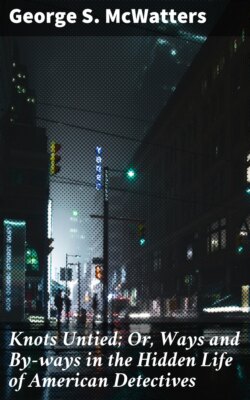Читать книгу Knots Untied; Or, Ways and By-ways in the Hidden Life of American Detectives - George S. McWatters - Страница 23
На сайте Литреса книга снята с продажи.
First Seizure of Guns at the North.
ОглавлениеTable of Contents
Always vigilant, and, everywhere that he was able, ready and prompt to serve the government, it must have been a matter of proud satisfaction to Officer McWatters when he made the first seizure of guns which occurred at the North during the war, and which guns were intended by their Northern consignors—sympathizers with the rebellion—to be used by their Southern consignees to shoot down the patriot forces. This seizure is thus recorded in the Tribune of May 12, 1861:—
"The vigilance of the police was yesterday evinced by the seizure of four nine-pound Dahlgren guns by Officer McWatters, of the Steamboat and Railroad Police, on Pier No. 3, North River."
It will be recollected by all who watched the current affairs of the war, that it was in regard to this seizure by Officer McWatters, that Fernando Wood, then Mayor of New York, so infamously and cowardly made an unasked apology to Robert Toombs of Georgia. Communication with the South was not at that time suspended, and he telegraphed to the secessionist his regrets at the seizure, and added assurance that if he had had control of the police the guns should be restored, or that he would have forbidden the seizure. Such was the substance of his telegram. But fortunately for the honor of the nation, as well as of the city of New York, the control of the police had, before that time, been taken from Mayor Wood. But his telegram sent a thrill of shame through all patriotic hearts, and added a new lustre to the merit of Officer McWatters' deed, by the contrast in which it placed the two men—the dutiful, freedom-loving police officer, and the poor creature who, having escaped the issues of a criminal trial by pleading the statute of limitations, had been borne on the shoulders of a "Sixth Ward brigade" of repeating voters to the questionable height of the Mayoralty of New York.
It is, perhaps, worthy of note here that the virtues of Fernando Wood have since been duly rewarded by an appreciative constituency in New York, who have sent him for several terms as their fit representative to the Congress of the nation. It is seldom that the historiographer has the opportunity of recording such a lofty expression of the "gratitude of republics;" and the writer hereof takes especial pleasure in fixing it here "in eternal types." Officer McWatters' due reproof for the seizure is fitly found in the fact, that a noble constituency like Wood's, would, if they could, have annihilated him for the deed.
